Find Help
More Items From Ergsy search
-

Redundancy Crusader and Annabel Kaye on making redundancy a better experience (2).MTS
Relevance: 100%
-

Redundancy Coaching Couch 1: Redundancy and Presuppositions
Relevance: 67%
-

Redundancy Coaching Couch 2: Redundancy and Passion
Relevance: 65%
-

Redundancy Coaching Couch 7: Redundancy and Judgement.MTS
Relevance: 64%
-

Redundancy Coaching Couch 5: Redundancy and Feedback.MTS
Relevance: 64%
-

Redundancy Coaching Couch 4:Redundancy and Language
Relevance: 62%
-

Redundancy Crusader and Annabel Kaye on scope and scale of redundancy (3).MTS
Relevance: 61%
-

Redundancy Crusader and Annabel Kaye on communications in redundancy (5).MTS
Relevance: 61%
-

Redundancy Crusader and Annabel Kaye on the Current Model of Redundancy (1).MTS
Relevance: 59%
-

Redundancy Coaching Couch 3: States
Relevance: 59%
-

How should employers manage the emotional impact of redundancy on employees?
Relevance: 58%
-

What are the legal requirements for redundancy in the UK?
Relevance: 57%
-
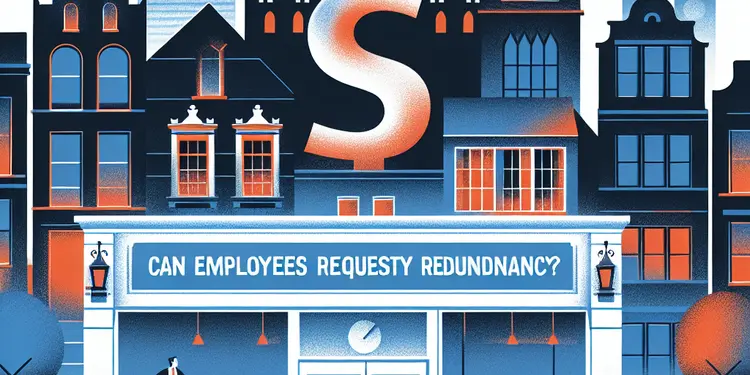
Can employees request voluntary redundancy?
Relevance: 57%
-

What is the role of trade unions in the redundancy process?
Relevance: 56%
-

What are the legal requirements for redundancy in the UK?
Relevance: 56%
-

What is the primary purpose of redundancy?
Relevance: 55%
-

What is the primary purpose of redundancy?
Relevance: 55%
-

How is redundancy pay calculated in the UK?
Relevance: 55%
-
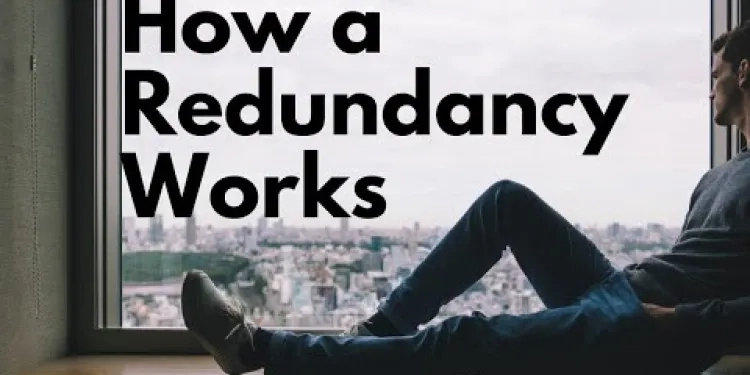
HOW A REDUNDANCY WORKS - General Information
Relevance: 54%
-
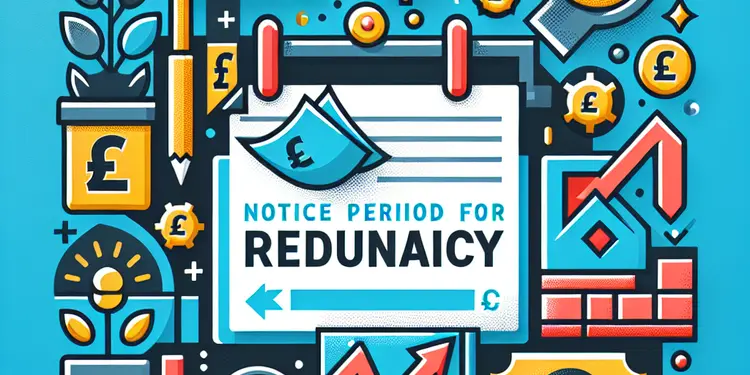
What is the notice period for redundancy?
Relevance: 54%
-
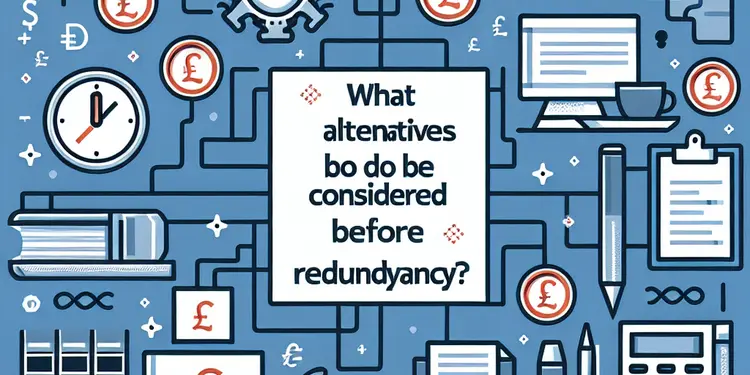
What alternatives should be considered before redundancy?
Relevance: 54%
-

What is redundancy pay and who is eligible for it?
Relevance: 54%
-

What is redundancy pay and who is eligible for it?
Relevance: 53%
-

What is a fair selection process for redundancy?
Relevance: 53%
-

Can an employee appeal a redundancy decision?
Relevance: 53%
-
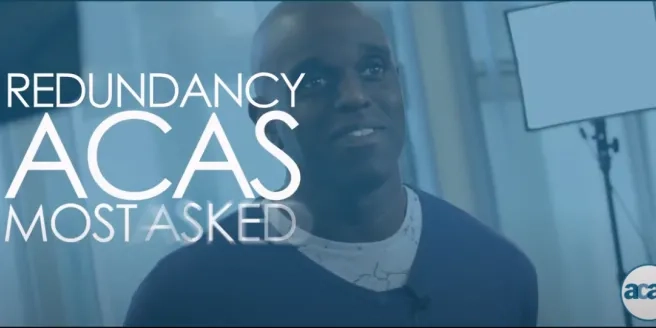
Frequently asked questions about redundancy from ACAS
Relevance: 52%
-

What happens if an employer does not follow the redundancy process?
Relevance: 52%
-

What support can employees expect during redundancy?
Relevance: 52%
-
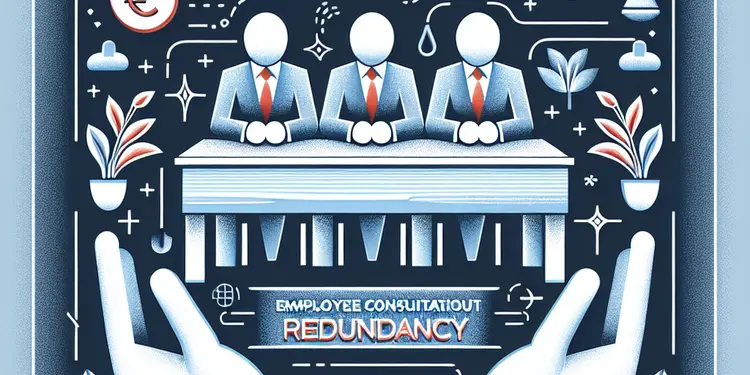
How should companies consult employees about redundancy?
Relevance: 52%
-

Are there any protections for employees on maternity leave during redundancy?
Relevance: 50%
-

How should companies consult employees about redundancy?
Relevance: 49%
-

How important is work experience for entering a nursing program?
Relevance: 34%
-

What should I do if I experience side effects from a vaccine?
Relevance: 33%
-

Should I stop taking antibiotics if I feel better?
Relevance: 32%
-

How can I ensure I get better customer service with a new bank?
Relevance: 32%
-

What should I do if I experience problems with my Turkey Teeth?
Relevance: 32%
-

What should I do if I experience sudden tinnitus?
Relevance: 32%
-

Can switching banks help me budget better?
Relevance: 31%
-

Can fathers experience postnatal depression?
Relevance: 31%
-

Is prior experience required to work at the National Trust?
Relevance: 31%
Redundancy Crusader and Annabel Kaye on Making Redundancy a Better Experience
Understanding the Role of the Redundancy Crusader
The Redundancy Crusader is a pivotal figure in the sphere of employment transition within the United Kingdom. Their primary mission is to mitigate the negative impacts of redundancy on employees. By providing support, resources, and informed advice, the Redundancy Crusader equips individuals with the tools to navigate the often turbulent waters of job loss. This initiative focuses on ensuring workers understand their rights, the redundancy process, and the steps they can take to secure their future employment. Through seminars, workshops, and one-on-one sessions, the Redundancy Crusader aims to transform redundancy from a daunting experience into a manageable transition.Annabel Kaye: A Champion for Employee Rights
Annabel Kaye is a renowned advocate for employee rights and has contributed significantly to reshaping the redundancy experience in the UK. With a background in employment law and extensive experience in HR consultancy, Kaye brings a wealth of knowledge to the table. She emphasizes the importance of transparent communication between employers and employees during the redundancy process. Kaye advocates for fair redundancy packages, psychological support, and the provision of career counseling services. Her work highlights the necessity of compassion and fairness, ensuring that employees are treated with dignity and respect as they transition out of their roles.Strategies for a Better Redundancy Experience
Both the Redundancy Crusader and Annabel Kaye agree that a better redundancy experience starts with preparation and support. Here are some key strategies: 1. **Transparent Communication:** Keeping employees informed about the process, reasons for redundancy, and their rights is crucial. 2. **Support Systems:** Implementing robust support systems like counseling services, job placement assistance, and financial advice can alleviate the stress of redundancy. 3. **Skill Development:** Offering training programs can help redundant employees acquire new skills, making them more marketable in the job hunt. 4. **Fair Packages:** Ensuring redundancy packages are fair and legally compliant provides financial relief during the transition period. 5. **Legal Guidance:** Access to legal advice helps employees understand their entitlements and safeguards their rights.Conclusion
Navigating redundancy is challenging, but with the guidance of the Redundancy Crusader and advocates like Annabel Kaye, the experience can be significantly improved. Their combined efforts focus on providing necessary support, fostering transparent communication, and upholding fair practices, ensuring that employees facing redundancy can do so with confidence and dignity. In the evolving landscape of employment, these initiatives are crucial for fostering a humane and supportive approach to redundancy in the United Kingdom.Redundancy Crusader and Annabel Kaye: Helping People with Job Loss
What Does the Redundancy Crusader Do?
The Redundancy Crusader is a helpful person who supports people when they lose their jobs in the UK. Their main job is to help people feel less upset about losing their jobs. They give people advice, tools, and help to understand what to do next. They make sure workers know their rights and understand the job loss process. The Redundancy Crusader holds talks, workshops, and one-on-one meetings to help people feel less scared and more in control.Who is Annabel Kaye?
Annabel Kaye fights for workers' rights. She has worked hard to make losing a job a better experience in the UK. Annabel knows a lot about laws that protect workers. She says it is very important for bosses to talk openly to workers when someone may lose their job. Annabel wants bosses to give fair pay packages, emotional support, and career advice to help people who lose their jobs. She believes in treating workers kindly and fairly.How to Make Losing a Job Easier
The Redundancy Crusader and Annabel Kaye say that planning and support make losing a job easier. Here are some tips: 1. **Clear Talk:** It is very important for bosses to explain why someone is losing their job and what rights they have. 2. **Helping Hands:** Bosses should offer help like counseling, job search support, and money advice to reduce stress. 3. **Learn New Skills:** Training can help people learn new things and find new jobs. 4. **Fair Money:** Giving fair and legal pay helps people financially when they lose a job. 5. **Know Your Rights:** Getting legal help can make sure people know what they are allowed to get.Summary
Losing a job is hard, but the Redundancy Crusader and Annabel Kaye can make it better. They help by giving support, encouraging clear talk, and ensuring fairness. With their help, people facing job loss can feel more confident and respected. These initiatives in the UK are important for treating people kindly when they lose jobs. For extra help, people can use tools like: - **Mind mapping apps** for organizing thoughts. - **Audiobooks** or **read-aloud tools** for better understanding.Frequently Asked Questions
What is redundancy?
Redundancy is a form of dismissal from your job, caused by your employer needing to reduce the workforce. This can happen due to various reasons such as company restructuring, cost-cutting measures, or company closure.
What are my rights if I am made redundant?
Employees in the UK have several rights if they are made redundant, including the right to a redundancy payment, the right to a consultation with your employer, the right to notice, and the right to time off to look for a new job or to arrange training.
How is redundancy pay calculated?
Redundancy pay is calculated based on your age, length of service, and your weekly pay, up to a limit. Statutory redundancy pay is capped at 20 years of service, with different rates depending on age: half a week’s pay for each year under 22, a week’s pay for each year between 22 and 40, and one and a half week’s pay for each year over 41.
Can I be made redundant if I am on maternity leave?
You can be made redundant while on maternity leave, but it should not be due to the fact that you are on maternity leave. You have the right to return to your job or an equivalent job with similar terms and conditions.
Do I have to accept the redundancy package offered by my employer?
You do not have to accept the redundancy package offered by your employer if you believe it does not meet the legal requirements or if you think it is unfair. You can seek advice or negotiate for better terms.
Can I appeal against a redundancy decision?
Yes, you can appeal against a redundancy decision if you believe it is unfair. You should first raise your concerns with your employer, and if necessary, you can seek advice from a legal professional or a trade union.
What support can I expect from my employer if I am made redundant?
Your employer should provide support such as reasonable notice, redundancy pay, and possibly help with finding a new job or arranging training. Some employers may offer additional support like counselling or outplacement services.
What is a consultation period in the redundancy process?
A consultation period is a time when your employer should discuss the redundancy with you, explain the reasons for it, and explore any alternatives. The length of the consultation period can vary depending on the number of redundancies being made.
Can voluntary redundancy be an option?
Yes, voluntary redundancy can be an option where employees choose to leave the company in return for a redundancy package. It is often used by employers to avoid compulsory redundancies.
What is the notice period for redundancy?
The notice period for redundancy depends on your length of service. Statutory notice periods are one week if you’ve been employed for between one month and two years, and one week for each year of service if employed between two and 12 years, with a maximum of 12 weeks' notice for 12 years or more.
Can my employer rehire for my position after making me redundant?
If your employer makes you redundant and then hires someone else for the same role, it could be a sign that the redundancy was not genuine. In such cases, you may have grounds to challenge the redundancy decision.
What should I do if I think my redundancy was unfair?
If you believe your redundancy was unfair, you should speak to your employer and seek an explanation. If you are not satisfied, consider seeking advice from a legal professional, a trade union, or the Advisory, Conciliation and Arbitration Service (ACAS). You may also consider making a claim to an employment tribunal.
Can I be made redundant if I have less than two years of service?
Yes, you can be made redundant regardless of the length of service. However, if you have less than two years of service, you may not be entitled to statutory redundancy pay, although other entitlements like notice and consultation still apply.
Do I have to work during my notice period after redundancy?
You may be required to work through your notice period after being made redundant, but this can vary depending on your contract and the agreement with your employer. Sometimes, employers may offer pay in lieu of notice.
Can I claim benefits if I am made redundant?
Yes, if you are made redundant, you may be eligible for certain benefits such as Jobseeker’s Allowance (JSA) or Universal Credit (UC) depending on your circumstances. It’s advisable to contact your local Jobcentre Plus office or visit the government website for more information.
What does redundancy mean?
Redundancy is when a job is no longer needed, and a person is let go from work.
If someone loses their job because of redundancy, it is not their fault.
Sometimes companies need to save money or change what they do, so some jobs go away.
To help understand more, you can talk to someone you trust or use a dictionary.
Redundancy means losing your job because your boss needs to have fewer workers. This can happen if the company changes, needs to save money, or shuts down.
What can I do if I lose my job?
If you lose your job because your company does not need you anymore, it is called being "made redundant." Here is what you can do:
Know your rights: You should check what your rights are. This means finding out what you can get, like money you are owed.
Get advice: You can talk to someone who can help. This can be a friend, family member, or someone at a place like a Citizens Advice Bureau.
Ask for help: If you need, you can ask for help from a union if you are part of one.
Remember, you have the right to understand what is happening, and there are people who can help you.
In the UK, workers have rights if they lose their job because of redundancy. This means:
- They can get a payment called a redundancy payment.
- They can talk to their boss about it. This is called a consultation.
- They have to be told in advance. This is the right to notice.
- They can take time off to find a new job or to get training.
If you need help understanding your rights, you can ask a friend, family member, or a support group to help explain things. Using simple apps or websites can also make information easier to read.
How Do You Work Out Redundancy Pay?
Redundancy pay is money you get when you lose your job because there is no more work. Here is how you can find out how much you will get:
- Check how long you have worked at the company. You need to have worked there for at least 2 years.
- Think about your age. People of different ages might get different amounts.
- Look at your weekly pay before tax. This helps decide the amount you get.
You can use online calculators to help work out your redundancy pay. You can also ask someone to help you if you are not sure.
If you lose your job because of redundancy, you can get some money. This is called redundancy pay. How much money you get depends on three things: your age, how long you worked there, and your weekly pay. There is a limit to how much you can get.
If you worked for up to 20 years, the money you get changes if you are:
- Under 22 years old: Half a week’s pay for each year you worked.
- Between 22 and 40 years old: One week’s pay for each year you worked.
- Over 41 years old: One and a half week’s pay for each year you worked.
If reading is hard for you, you can ask someone to read this with you. Using tools like text-to-speech software can also help.
Can I lose my job if I am on maternity leave?
If you are on maternity leave, your job is safer. But sometimes, if a company needs to make big changes, jobs might be removed.
If this happens to you, the company must treat you fairly and offer other jobs if they can.
If you have trouble reading, you can ask someone you trust to help you. You can also use tools like audiobooks to listen to information.
You can lose your job while you are on maternity leave, but it should not be because you are on maternity leave. You have the right to come back to your job or a similar job with the same pay and rules.
Do I have to take the money my boss gives me if I lose my job?
If you lose your job, your boss might give you some money. This is called a 'redundancy package'.
You do not have to say 'yes' to it right away. Take your time to think about it. Talk to someone you trust, like a family member or a friend.
You can also get help from a professional. They are experts who can give you good advice.
Remember, it is okay to ask questions if you do not understand something.
You do not have to take the money your job is giving you if you lose your job and think it is not fair or not following the rules. You can ask for help or talk to them to try and get a better offer.
Here is something that might help:
- Ask for Help: Talk to someone who knows the rules, like a lawyer or a person who helps with jobs.
- Talk to Your Job: See if you can make a better deal by talking to them.
Can I ask for my job back if they say I am not needed anymore?
If you think losing your job is not fair, you can try to change the decision. First, talk to your boss and tell them your worries. If you need more help, you can ask a lawyer or someone from a work help group for advice.
What help will my boss give me if I lose my job?
If you lose your job, your boss might give you some help.
Here are some ways they can help:
- They might give you money to help you while you look for a new job.
- They could help you write a new CV or resume.
- You may get advice on finding a new job.
- They might tell you about job training programs.
Remember, you can ask your boss about the help they offer.
Your boss should help you if you lose your job. They should tell you early, give you money, and maybe help you find another job or learn new skills. Some bosses might also give extra help like talking to a counselor or services to help you find a job.
What is a consultation period when someone might lose their job?
A consultation period is a time when bosses talk with workers.
They talk about job losses.
This is called redundancy.
The bosses and workers try to find the best way forward.
They hope people can keep their jobs or understand what will happen next.
Tips:
- Ask questions if you don't understand.
- You can bring someone to help you, like a friend or family member.
- Write down what they say to remember it.
A consultation time is when your boss talks to you about losing your job. They will tell you why it is happening and see if there is another way instead. How long this takes depends on how many people are losing their jobs.
Can I choose to leave my job with pay?
Yes, sometimes people can choose to leave their job. This is called voluntary redundancy. They get a package, which means they receive some money for leaving. Companies do this to avoid having to make people leave their job if they don't want to.
How long is the notice before your job ends?
When you lose your job because of redundancy, your boss needs to tell you in advance. This is called a notice period. The notice period depends on how long you have worked there.
1. If you have worked for 1 month to 2 years, you get 1 week’s notice.
2. If you have worked for more than 2 years, you get 1 week’s notice for every year you have worked. But, the most you can get is 12 weeks’ notice.
If reading is hard, there are tools that can help. You can use apps that read text out loud. You can also ask someone to explain the steps to you.
Can my boss give my job to someone else after letting me go?
If you lose your job because the company says they don't need your role anymore, and then they hire someone else for that same job, something might be wrong. You can ask questions to see if this was fair.
What can I do if I think losing my job was not fair?
If you feel losing your job was not fair, here are some things you can do:
- Talk to someone you trust for advice. This could be a family member, friend, or helper.
- Write down why you think it was not fair. This will help you remember the details.
- Find out if there is a special office or person who helps with job problems.
- You can ask for help from a group that helps workers. They can tell you what to do next.
- Use a computer tool to help with reading or writing if you find it hard on your own.
Remember, it is important to get help if you think something is not right.
If you think it was not fair to lose your job, talk to your boss and ask why. If you are still unhappy, you can get help from a lawyer, a trade union, or ACAS (a group that helps with work problems). You can also think about going to a special work court to make a claim.
Can I lose my job if I have worked less than two years?
If you have worked at your job for less than two years, your boss might still let you go. This means you could lose your job.
You should talk to someone who knows the rules about work. They can help you understand what can happen next.
If you know a union, they can also help you understand your rights. Talking to an expert can make things clearer for you.
Yes, you can lose your job because of redundancy no matter how long you have worked there. But if you have worked less than two years, you might not get the extra money called 'redundancy pay.' You still have the right to get a warning and to talk about this.
Do I need to work after I am told my job is ending?
If your job is ending, this is called redundancy. You might wonder if you need to work until your last day.
Here is what you can do:
- Check your work contract. It will tell you what to do.
- Ask your boss what they want you to do.
- Talk to someone in Human Resources (HR). They can help explain things to you.
Helpful tips:
- Use a calendar to mark your last day at work.
- Write down any questions you have and ask someone to help you understand.
- Find a friend or support person to talk to if you feel worried.
When you lose your job, you might still have to work for a little while. This is called your notice period. It depends on what your work contract says and what you and your boss agree on. Sometimes, your boss might give you money instead of making you work during this time.
Can I get some money help if I lose my job?
If you lose your job, you might get some money help. Here's what you can do:
- Visit a local advice center. They can tell you what money help you can get.
- Ask someone you trust to help you fill out forms. Filling forms is easier with help.
Remember, you are not alone. There are people who can help you.
If you lose your job, you might get some help. You can ask for Jobseeker’s Allowance (JSA) or Universal Credit (UC). This depends on your situation. You should talk to the local Jobcentre Plus office or look at the government website to learn more.
Useful Links
This website offers general information and is not a substitute for professional advice.
Always seek guidance from qualified professionals.
If you have any medical concerns or need urgent help, contact a healthcare professional or emergency services immediately.
Some of this content was generated with AI assistance. We’ve done our best to keep it accurate, helpful, and human-friendly.
- Ergsy carfully checks the information in the videos we provide here.
- Videos shown by Youtube after a video has completed, have NOT been reviewed by ERGSY.
- To view, click the arrow in centre of video.
- Most of the videos you find here will have subtitles and/or closed captions available.
- You may need to turn these on, and choose your preferred language.
- Go to the video you'd like to watch.
- If closed captions (CC) are available, settings will be visible on the bottom right of the video player.
- To turn on Captions, click settings .
- To turn off Captions, click settings again.
More Items From Ergsy search
-

Redundancy Crusader and Annabel Kaye on making redundancy a better experience (2).MTS
Relevance: 100%
-

Redundancy Coaching Couch 1: Redundancy and Presuppositions
Relevance: 67%
-

Redundancy Coaching Couch 2: Redundancy and Passion
Relevance: 65%
-

Redundancy Coaching Couch 7: Redundancy and Judgement.MTS
Relevance: 64%
-

Redundancy Coaching Couch 5: Redundancy and Feedback.MTS
Relevance: 64%
-

Redundancy Coaching Couch 4:Redundancy and Language
Relevance: 62%
-

Redundancy Crusader and Annabel Kaye on scope and scale of redundancy (3).MTS
Relevance: 61%
-

Redundancy Crusader and Annabel Kaye on communications in redundancy (5).MTS
Relevance: 61%
-

Redundancy Crusader and Annabel Kaye on the Current Model of Redundancy (1).MTS
Relevance: 59%
-

Redundancy Coaching Couch 3: States
Relevance: 59%
-

How should employers manage the emotional impact of redundancy on employees?
Relevance: 58%
-

What are the legal requirements for redundancy in the UK?
Relevance: 57%
-

Can employees request voluntary redundancy?
Relevance: 57%
-

What is the role of trade unions in the redundancy process?
Relevance: 56%
-

What are the legal requirements for redundancy in the UK?
Relevance: 56%
-

What is the primary purpose of redundancy?
Relevance: 55%
-

What is the primary purpose of redundancy?
Relevance: 55%
-

How is redundancy pay calculated in the UK?
Relevance: 55%
-

HOW A REDUNDANCY WORKS - General Information
Relevance: 54%
-

What is the notice period for redundancy?
Relevance: 54%
-

What alternatives should be considered before redundancy?
Relevance: 54%
-

What is redundancy pay and who is eligible for it?
Relevance: 54%
-

What is redundancy pay and who is eligible for it?
Relevance: 53%
-

What is a fair selection process for redundancy?
Relevance: 53%
-

Can an employee appeal a redundancy decision?
Relevance: 53%
-

Frequently asked questions about redundancy from ACAS
Relevance: 52%
-

What happens if an employer does not follow the redundancy process?
Relevance: 52%
-

What support can employees expect during redundancy?
Relevance: 52%
-

How should companies consult employees about redundancy?
Relevance: 52%
-

Are there any protections for employees on maternity leave during redundancy?
Relevance: 50%
-

How should companies consult employees about redundancy?
Relevance: 49%
-

How important is work experience for entering a nursing program?
Relevance: 34%
-

What should I do if I experience side effects from a vaccine?
Relevance: 33%
-

Should I stop taking antibiotics if I feel better?
Relevance: 32%
-

How can I ensure I get better customer service with a new bank?
Relevance: 32%
-

What should I do if I experience problems with my Turkey Teeth?
Relevance: 32%
-

What should I do if I experience sudden tinnitus?
Relevance: 32%
-

Can switching banks help me budget better?
Relevance: 31%
-

Can fathers experience postnatal depression?
Relevance: 31%
-

Is prior experience required to work at the National Trust?
Relevance: 31%


